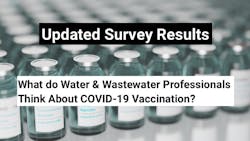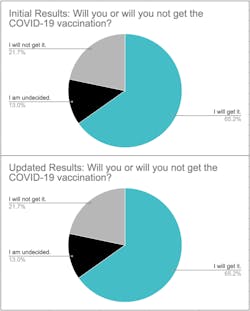COVID-19 Vaccination Update: What do Water & Wastewater Professionals Think?
Bob Crossen is seniorr managing editor for Water & Wastes Digest. Crossen can be reached at [email protected].
Three weeks ago, Water & Wastes Digest asked its newsletter audience to share its attitudes and feelings about the COVID-19 vaccine. On Jan. 11, preliminary results from 23 respondents were shared in an article, and WWD asked for more responses. After two weeks, the survey now has 118 responses. So have the results changed?
In the initial survey, 15 of the 23 respondents said they would get the vaccine, 5 said they would not and 3 said they were undecided. With 118 responses, the proportion of those who said they would get the vaccine, would not get the vaccine and were undecided did not change much.
In the updated results, 79 respondents said they would get the vaccine, 28 said they would not get the vaccine and 12 said they were still undecided. Below are the results side by side, showing how the proportion has remained mostly the same, despite a large difference in survey responses.
A full list of responses can be found at a link at the end of this article.
Reasons Why Professionals Want the Vaccine
As noted in the previous report, those who indicated they would be receiving the vaccine had many reasons why they felt the need to to do so. These primarily revolved around issues of ensuring safety for families and communities, getting society back to a sense of normalcy, and making sure they felt safe during what has been an otherwise uneasy period of life.
Below are some verbatim responses picked by editors to highlight those primary attitudes. (Editor’s note: These have been copied and pasted directly from the survey responses. Grammatical errors are those of the respondents.)
- Too old to survive COVID-19
- I would like to lessen my chance of catching COVID-19 and passing it along to my loved ones and coworkers.
- I will get the vaccine to reduce the risk of getting a Covid-19 infection and to reduce the risk to family, friends, and the general public.
- I believe it will be safe enough with minimal side affects.
- at 85, I'm in the high risk pool. the Vaccine should prevent me from spreading the virus should I become infected and be asymptomatic.
- I kind of want to regain some sense of normalcy and we can't be trusted to take care of it on our own.
- I believe it is our civic responsibility.
- Too help speed up life "back to normal" for everyone.
- I've done a high level review of the efficacy and safety studies, and the health care professionals in my life have done a deeper dive. They don't find this to be any more risky than the 40-60% effective flu shot I get annually. The same logic applies - I could likly handle the flu fine, but I don't want to be a part of the spread. Same here; I'll do my small part to limit the spread to the most at risk by taking the vaccine.
- I trust this has been properly developed and tested and will be the fastest, safest route to dealing with COVID-19
- I feel it is my responsibility to do my part to get control of the pandemic
- I get other vaccines. I will get this one. It helps everyone. No vaccine is perfect but at least i have a chance to mot get sick or not as sick
- Vaccines are one of the most wonderful developments in modern history. I'm old enough to remember seeing people who were afflicted with polio - awful! I will do whatever it takes to get back to "normal" as soon as possible. The number of deaths from this virus is unbelievably awful.
- I trust that risk of adverse reactions is low and moving back to gathering with friends and family is important for our mental health.
- The best way to get back to a sense of normalcy
- I want life to return to normal and this is an important step.
- My wife and mother are high risk and I want to stop the spread of the disease.
- I tend to trust the scientific process. While seeing there is a handful of negative reactions to the vaccine, its statistically a safe remedy and its a better solution than waiting for it to go away, which it won't.
-
Reasons Why Professionals Do Not Want the Vaccine
In the previous report, the respondents who said they would not get the vaccine indicated a distrust of the vaccination development and testing process. This distrust was echoed in a social media poll on the Water/Wastewater Operators of the World, Unite! page where the majority indicated they would not get the vaccine with similar reasons as to why. They argue that the speed of development was too fast to determine long-term side effects.
As with the responses above, below are verbatim answers from those indicating why they will not get the vaccination. As noted above, these also have not been edited and grammatical errors are those of the respondents.
- There is no guarantee it is safe.
- The virus is being used for political reasons
- I have had covid and understand from a close friend (who is the head of the infectious disease department at the local hospital) Those who have had covid and get the vaccine have more severe side effects. Add to the face that i cannot take the flu vaccine due to reactions in the past, I am not willing to take the vaccine.
- I believe in letting your own immune system work
- waiting to see how it goes for other, virus is not that dangerous
- I don’t typically get the flu shot and I am seldom sick. I am not an anti-vaccine person though.
- I will not get it because thee has not been enough testing. What are the side effects going to be. I'm no Guinea pig.
- Because the Pfizer and Moderna vaccines were developed with Stem cells from aborted fetuses.*
- I was given anti-seizure meds for brain surgery due to an accident. It was hospital policy and to give anti-seizure meds after brain surgery. I developed SJS Syndrome and returned to the hospital for further treatment.
- It is my informed choice
- Already had covid
- Not enough research on side effects yet
- I feel that in a rush to get a vaccine, it may not have been thoroughly vetted.
- I don’t trust the vaccine, the company that makes it or the government that approved it.
- I don't trust the first launch, kinda like a new edition cell phone, you have to wait till all the kinks are worked out.
- not enough information available, the long term affects are unknown
- The vaccine is new technology and the long-term effects are unknown.
- 1. Very high risk. These vaccines have not gone thru the normal rigorous testing for vaccines. Also, animal tests that have been done have all resulted in significant problems. 2. While the Covid-19 is bad, real data on the impact has been skewed by money. If you examine death and hospitalization rates, while the numbers for Covid have gone up dramatically, numbers for flu and pneumonia have decreased almost as much. Looking at death rates from disease overall, 2020 is very much in line with previous years. It's just that now everything is being blamed on Covid (it pays well) while other causes have diminished just as much.
- I don't trust the science
- This vaccine was rushed into market. I'll wait and see. Second reason is that I'm not a high risk group. I'm young and have a strong immune system.
* Moderna and Pfizer are synthetic mRNA vaccines that do not use human fetal cell lines, and human fetal tissue is not contained in those vaccines. That said, news reports do note human fetal cell tissue was used at one point for a confirmation test of those vaccines during development. The vaccines produced by AstraZeneca and Jansen, however, do use human fetal tissue, which as been a matter of controversy for those vaccines, particularly in religious communities. (Sources: KSL 5 TV, Fact Check Northern Ireland, National Catholic Reporter)
Reasons Why Professionals are Undecided on the Vaccine
The reasons why people are on the fence for getting the vaccine are similar to those of the people who will not get them. They worry about long-term side effects and would rather wait to see how things play out before getting the vaccination themselves. Below are their verbatim responses.
- I already had covid 19
- I have tested positive so I'll wait and see.
- I am waiting until more side effects are documented/published!
- Wish to see what reactions people get with it
- Not enough information on side effects.
Conclusion & Published Full Results
While the WWD research shows a greater proportion of professionals are interested in getting the vaccine, other polls have shown the opposite. This indicates that the issue is hotly contested and debated, and likely will remain so for quite some time. Additionally, while WWD did much to ensure responses were anonymous, fear of reprisal for responses to the survey could have also skewed the results toward those who were most interested. In any case, the responses above highlight the feelings and attitudes of those on all sides of the matter, and provide a basis to begin deeper discussions on whether to receive or not receive a vaccination for COVID-19.
Below is a link to a published dashboard of all the results. Editors have not changed or edited the responses in any way, and the feelings and attitudes displayed in the report are those of the respondents, not Water & Wastes Digest.

